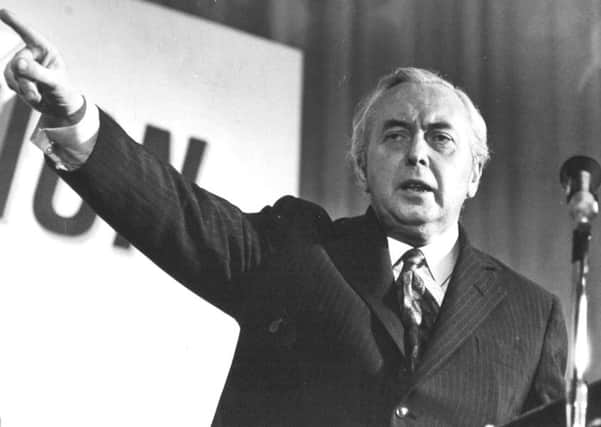Tom Richmond: The EU referendum lessons David Cameron can learn from Harold Wilson


David Cameron is not the only Prime Minister to face such a predicament.
A similar fate befell Harold Wilson after the second general election of 1974 left him with the most slender of Commons majorities – and an obligation to honour his promise of a referendum on the UK’s membership of the then European Economic Community.
Advertisement
Hide AdAdvertisement
Hide AdYet, ahead of next Friday’s centenary of the birth of the last Yorkshireman to occupy 10 Downing Street, this is where the similarities end.
For while, believe it or not, the Cameron government is far more united than Wilson’s, even after the past fortnight’s feuding, the contrasting approach of the respective Prime Ministers could not be more different.
Despite Huddersfield-born Wilson being the first media-savvy premier to exploit the power of television, he chose to stay above the fray while the “big beasts” from his Government – statesmen far greater in stature than today’s generation of Ministers – slugged it out. In comparison, the presidential Cameron looks an increasingly desperate “one-man government” who believes that only he can convince a sceptical Britain to resist his now ex-friend Boris Johnson’s overtures and vote to stay in a discredited European Union.
If he wishes to win on June 23 and save his political reputation, perhaps Cameron should follow Wilson’s example from 1975.
Advertisement
Hide AdAdvertisement
Hide AdBy all accounts, Wilson, a reluctant European, and Jim Callaghan, his Foreign Secretary, used the power of their argument to convince the Cabinet to vote 16-7 in favour of recommending Britain to stay in Europe because of the trade opportunities. Sceptics won over included Leeds South MP Merlyn Rees, the then Northern Ireland Secretary.
Contrast this with Cameron’s approach when he returned from Brussels a fortnight ago – the Cabinet meeting barely lasted two hours before being totally overshadowed by the scheming Mayor of London.
Perhaps he would have been better served allowing a fuller debate, and settling protocols such as the access to Ministerial papers for those campaigning to leave the EU, rather than allowing these to spill over into public and then Matthew Hancock, the over-promoted and under-qualified Cabinet Office Minister, facing ridicule in the Commons over the arrangements as he tried, and failed, to defend the indefensible.
As Bernard Donoughue, the head of Wilson’s policy united, noted in his acclaimed memoir The Heat Of The Kitchen: “Wilson’s style of consensual agnosticism, legitimised by an election mandate, made it easier for him to hold the Cabinet together.”
Advertisement
Hide AdAdvertisement
Hide AdIn contrast, Cameron has already been accused of scaremongering over the consequences of Brexit, and using unnamed aides from his project Fear dirty tricks department to slander the reputation of opponents.
Though Wilson did not have to contend with the relentless demands of the 24/7 news media, or the scrutiny of social media, he left the day-to-day campaign management to a special Referendum Unit set up in the Foreign Office under the aforementioned Callaghan.
At least Callaghan could be trusted not to swear at opponents, the undiplomatic charge now levelled against Philip Hammond, the current Foreign Secretary.
Even then, Wilson only joined the campaign in the latter days – Donoughue recalls that his boss dictated “his long and rambling speeches himself to demonstrate that he was not in the hands of the so-called ‘Euro-fanatics’ surrounding him”. His intervention was that sensitive.
Advertisement
Hide AdAdvertisement
Hide AdOf course this was an era when oratory mattered – Wilson’s Cabinet opponents, like Michael Foot, Tony Benn and Barbara Castle, were not only household names. They were political box office and their stirring speeches invigorated an already electric debate.
If only the same could be said about Cameron. The Prime Minister appears to be using his power of patronage to keep some Cabinet colleagues on board while deploying Project Fear to denigrate his opponents.
Yet the current Tory leader’s argument is so weak that he has still to answer this withering critique by Work and Pensions Secretary Iain Duncan Smith: “The ‘in’ campaign’s whole strategy seems to be ‘ooh, it’s terrible, hang on to nurse for fear of something worse’.” In an apparent dig at the PM and his lack of ambition, he added: “I do not know why anybody would want to run a country like this. This country is the greatest on Earth.”
However, while Duncan Smith deserves great credit for persevering with his welfare reforms, he would be the first to admit that he is not an orator in the style of a Benn or Foot.
Advertisement
Hide AdAdvertisement
Hide AdDavid Cameron’s decision to make this campaign personal will leave him weaker and diminished. If he wins, politics will turn to the Tory succession after he said last year that he would not seek a third term. Already there’s talk of a leadership contest. If he loses, he will almost certainly have to resign. At least Wilson retained the element of surprise over his future intentions, leaving office the following year.
In contrast, Wilson was a pragmatist and, according to his confidant Lord Donoughue, was of the belief that “a victory for the ‘Nos’ would empower ‘the wrong kind of people’ in Britain; the Benn Left and the (Enoch) Powell Right who were often extreme nationalists, protectionist, xenophobic and backward-looking”.
He added: “His whole conduct was deeply Wilsonian, consultative and consensus-seeking. Throughout, he fudged and ducked and weaved. But he succeeded. He kept Britain in the Community as he always wished; he achieved the terms which his manifesto demanded.”
Unless David Cameron learns this lesson from history, he risks losing the most important election for a generation. For, while Harold Wilson won the EEC referendum by a convincing margin, the June 23 vote is too close to call and the outcome will definitely not settle the Europe question once and for all.
Harold Wilson remembered: A three-part series begins in The Yorkshire Post next Wednesday.